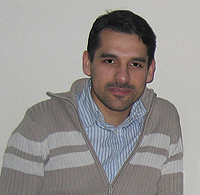On being European and Muslim
A scholar talks about exclusion, hope, and different ideas about 9/11

Ahmet Yukleyen, a Graduate School of Arts and Sciences Ph.D. candidate in anthropology, spent a year studying Turkish Muslims living in Germany and the Netherlands, with a focus on how their search for religious identity is shaped by their cultural history. Yukleyen, a Turkish Muslim who spent his youth in the Netherlands, spoke with BU Today about the many challenges that face Muslims living in Europe.
Recent clashes between Muslims and non-Muslims in Denmark, France, and all over Europe seem to show an increased unrest between Muslims and the greater European community. What’s behind that?
The idea that we can get to one answer that tells us why Muslims are acting in this way I find unsatisfactory.
Can you tell us what is at the root of the conflict in France?
Some experts say the riots in France don’t have any religious background at all. There were mosques among the institutions that were destroyed. It was male youths who are disenfranchised from the larger society. Lack of employment is rather high among the young population, and they have bad housing conditions. It’s a matter of social exclusion and the immigration policy characteristic of French Republicanism.
You have said many Muslims were offended by the publishing of the now-famous offensive cartoon in Denmark, but only a few reacted publicly. Why didn’t more react?
We may not find a group of 100 or 1,000 [Muslims] significant, but they may be very influential. This incident broke out in September last year, and there were a few protests. There were no violent incidents, and most of the protests were on the political level; letters were sent. But a small group of Muslim leaders decided to go on tour in the Middle East and raise an uproar on this issue with political leaders in other countries to gain support for their cause. A small group was able to mobilize a larger awareness of this incident; not too many people knew about it until that point. The transnational mobilization of the issue allowed it to become something that’s beyond Europe. The protests that involved violence were not in Europe. Mass mobilization and protest in Lebanon and Afghanistan often involve burning flags in protests. I don’t think it’s surprising in that sense. Whenever you get a mob, a political or religious riot, in these countries, you get an extent of violence.
How did Muslims in Europe react to 9/11?
State authorities in Europe were disappointed to see that the protests that came from Muslim leaders against the September 11 attacks has been weak, at least in their view. I asked [Muslims] about this and their response is that they ponder whether this was an act that came from Muslims. This conspiratorial thinking is very widespread. They believe there may be other reasons, other people. It’s partly a defense mechanism to defend one’s religious identity, but it causes mistrust as well. Having said that, all of them say they feel sorry that people died, but they don’t feel it’s the responsibility of Muslims or Islam.
Your research on Turkish Muslims in Denmark and Germany has shown a great diversity within the Muslim communities there. Does that diversity extend to the rest of Europe?
Yes. There are many ethnic divisions among Muslims. The North African Muslims, primarily from Morocco, Tunisia, and Algeria, are concentrated in France. South Asian Muslims from Pakistan, India, and Bangladesh often live in Britain. The Turkish Muslims, some who have Kurdish origins, are often in Germany. So you will have each ethnicity of Muslim listening to religious authority of their own ethnic community. Overall the majority is made up of moderate conservatives who may engage in some religious rituals, but they are not very religiously active. And then a significant number of people who are active and engaged and willing to negotiate their identities are seeking communal recognition of Islam in the European public sphere. This means they want Islam to be recognized as a religion by the states, which will have very practical implications, such as teaching Islam in public schools in Germany. The ban on the wearing of headscarves in French schools is a source of significant pressure there. Recognizing Islam in a way equal to Judaism and Christian denominations is a significant cause for these active Muslims.
So are the Muslim communities in Europe headed for peace or more conflict?
I think it’s uneven. In certain states it’s better than others. We have three major models that were more clear until recently. France is assimilationist. The secular nature of the state is dominant over any religious expression in the public sphere. It aims to control it. Then you have on the other end a multicultural model, where the state promotes a communal identity, such as in the Netherlands and Britain. Then in Germany you have something in between. After 9/11, these models are becoming more alike and the differences are disappearing. The ethnic division among Muslims is one of the obstacles they face in organizing themselves and establishing a common ground in what they expect from the state and what they want from society.